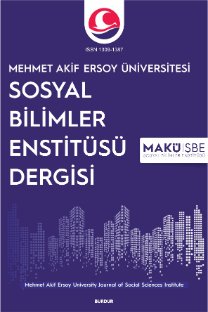The Relationship Between Multiple Intelligences and Academic Achievements Of Second Grade Students
Secondary school, Multiple intelligences, Academic achievement
___
may improve their self-concept. In addition, improvements in personal skills likely affect similar gains inacademic performance. Future research may examine which of the intelligence type that students
believe is associated with academic achievement and self-efficiency.
Akboy, R. (2004). E"itim psikolojisi ve çoklu zeka. Izmir: Dinazor Kitabevi
Akboy, R. & kiz, E. F. (2007). Psikolojik danı#ma ve rehberlikte ça"da# bir yakla#ım. Ankara: Nobel Yayınevi, ISBN: 978–9944–77–128–3.
Aprill, A. (2001). Toward a finer description of the connection between arts education and student achievement. Arts Education Policy Review, 102(5), 11-14.
Barnard, L. & Olivarez, A. (2007). Self-estimates of multiple, g factor and school-valued intelligences. North American Journal of Psychology, 9 (3), 501-510.
Butzlaff, R. ( 2000). Can music be used to teach reading? The Journal of Aesthetic Education, 34 (3- 4), 167-178.
Costa-Giomi, E. (1999). The effects of three years of piano instruction on children’s cognitive development. Journal of Research in Music Education, 47(3),198-212.
Costa-Giomi, E. (2004). Effects of three years of piano instruction on children’s academic achievement, school performance and self-esteem. Psychology of Music, 32(2), 139-152.
Çongur Ye"ilkaya, Ö. (2006). lkö"retim 4. ve 5. sınıf müzik e"itimi derslerinde çoklu zeka kuramının uygulanması. Ulusal Sınıf Ö#retmenli#i Kongresi Bildiri Kitabı 1. Cilt ISBN: 975-499-361-0. 14- 16 Nisan 2006, Ankara.536-541.
Demirsoz Selcioglu, E. & Kocaba", A. (2006). Zeka kuramına dayalı i#birlikli ö"renmenin eri#i ve hatırda tutma üzerindeki etkileri. Ulusal Sınıf Ö#retmenli#i Kongresi Bildiri Kitabı 1. Cilt ISBN: 975-499-361-0. 14-16 Nisan 2006, Ankara.522-535.
Eisner, E. (1998). Does experience in the arts boots academic achievement? Arts Education. 51(1), 7- 15.
Fraenkel, J. R. (1994). The evolution of the Taba Curriculum Development Project. The Social Studies, July/August, 85(4), 149-159.
Furnham, A. ( 2000). Thinking about intelligence. The Psychologist, 13 (10), 510-514.
Furnham, A. & Akande, A. (2004). African parents’ estimates of their own and their children’s multiple intelligences. Current Psychology: Developmental, Learning, Personality And Social, 22(4), 281-294.
Furnham, A. & Chamorro-Premuzic, T (2005). Estimating one’s own and one’s relatives’ multiple intelligence: A study from Argentina. The Spanish Journal of Psychology, 8(1), 12-20.
Frunham, A., Hosoe, T. & Tang, T. (2002). Male Hubris and female humility? A cross-cultural study of ratings of self, parental and sibling multiple intelligence in America, Britain and Japan. Intelligence, 30, 101-115.
Furnham, A. & Mottabu, R. (2004). Sex and culture differences in the estimates of general and multiple intelligences. A study comparing British and Egyptian Students. Individual Differences Research, 2 (2), 82-96.
Gardner, H. (1993). Multiple intelligences: The theory in practice. Basic Books: New York.
Gardner, H. (1999). Intelligence reframed: Multiple intelligences for the 21st century. Basic Books, New york.
Gouzouasis, P., Guhn, M. & Kishor, N. (2007). The predictive relationship between achievement and parcipation in music and achievement in core Grade 12 academic subjects, Music Education Research, Vol. 9, No:1, 81-92.
Gullatt, D. E. (2008). Enhancing Student learning through arts integration: Implications for the profession. The High School Journal, April/ May, 12-25.
Lopiccolo, J. & Blatt, S. J. ( 1972). Cognitive style and sexual identity. Journal of Clinical Psychology, 28(2), 148-151.
Kaptan-Aykaç, V. (2006). Sanat e"itiminde aktif ö"renme. Ulusal Sınıf Ö#retmenli#i Kongresi Bildiri Kitabı 1. Cilt ISBN: 975-499-361-0. 14-16 Nisan 2006, Ankara. 542-549.
Martin, A. (1998). Why theatre should be integrated into the curriculum. NASSP Bulletin, 82 (597), 30- 33.
Mnastersky, R. (2005). Studies show biological differences in how boys and girls learn about math, but social factors play a big role too. Chronicle of Higher Education, 51(26).
Munozi, M. A., Ross, S. M. & McDonald, A. J. (2007). Comprehensive school reform in middle schools: The effects of different ways of knowing an student achievement in a large uran district. Journal of Education For Students Placed at Risk, 12(2), 167-183.
Neto, F., Ruiz, F. & Furnham, A. (2008). Sex differences in self-estimation of multiple intelligences among Portuguese adolescents. High Ability Studies, 19(2), 189-204.
Rauscher, F. H. (2003). Can music instruction affect children’s cognitive development? ERIC Clearinghouse on Early Education and Parenting, ERIC Digest Available online at http:// www.ericdigests.org/2004-3/cognitive.html (accessed 10 january 2009).
Selcioglu, E. (2005). The effects of cooperative learning based on multiple intelligences theory on achievement and retention in music. Dokuz Eylul University, Educational Sciences Institute, unpublished graduate thesis.
Sternberg, R. J. (2008). Assessing what matters. Educational Leadership, 65, Issue 4, 20-26.
Vaughn, K. (2000). Music and mathematics: modest support for the oft-claimed relationship, The Journal of Aesthetic Education, 34 (3-4), 149-166.
- Yayın Aralığı: 4
- Başlangıç: 2009
- Yayıncı: Burdur Mehmet Akif Ersoy Üniversitesi Sosyal Bilimler Enstitüsü
Özlem TAGAY, Yaprak BAYDAN, Nilüfer VOLTAN ACAR
Lisansüstü Öğrencilerin Çoklu Zekâ Profilleri ve Eğitim Alanları
Kavram Haritası Tekniginin Genel İşletme Dersi İçin Uygulanması ve Ögrenci Görüşleri
Gelene!i Bozmak: Dil Ö!retmenlerinin Yeterliliklerini "n#a Etmek "çin Güçlü Bir Araç Olarak MI
The Graduate Students? Multiple Intelligence Profile and Their Education Routes
XIX. Yüzyılın İkinci Yarısında Bucak'ta İdari ve Sosyal Yapı
Türkiye'de Kamu İktisadi Teşekküllerine Bir Örnek: Keçiborlu Kükürt Fabrikası
Deconstructing The Canon: MI As a Powerful Tool to Build Language Teachers' Competence
